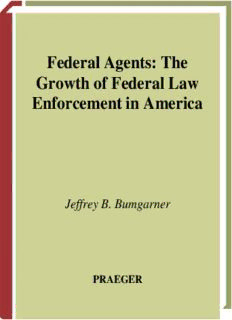
Federal Agents: The Growth of Federal Law Enforcement in America PDF
Preview Federal Agents: The Growth of Federal Law Enforcement in America
Federal Agents: The Growth of Federal Law Enforcement in America Jeffrey B. Bumgarner PRAEGER FEDERAL AGENTS FEDERAL AGENTS THE GROWTH OF FEDERAL LAW ENFORCEMENT IN AMERICA Jeffrey B. Bumgarner Library ofCongress Cataloging-in-Publication Data Bumgarner,Jeffrey B. Federal agents :the growth of federal law enforcement in America / Jeffrey B.Bumgarner. p.cm. Includes bibliographical references and index. ISBN 0–275–98953–4 (alk.paper) 1. Law enforcement–United States. I.Title. HV7561.B86 2006 363.20973—dc22 2006014288 British Library Cataloguing in Publication Data is available. Copyright © 2006 by Jeffrey B.Bumgarner All rights reserved. No portion of this book may be reproduced,by any process or technique,without the express written consent of the publisher. Library of Congress Catalog Card Number:2006014288 ISBN:0–275–98953–4 First published in 2006 Praeger Publishers,88 Post Road West,Westport,CT 06881 An imprint of Greenwood Publishing Group,Inc. www.praeger.com Printed in the United States of America The paper used in this book complies with the Permanent Paper Standard issued by the National Information Standards Organization (Z39.48–1984). 10 9 8 7 6 5 4 3 2 1 This book is dedicated to my wife Kathy and my sons Jack, Alex, and Carl. Thanks for patiently enduring another book project. Okay, boys—time to play “tackle.” This book is also dedicated to the men and women who have chosen to serve their country as federal law enforcement officers and agents. They have my heartfelt gratitude for the unending vigilance they exhibit in protecting the Homeland. Contents Preface ix Chapter 1. The United States Constitution and Federal Police Power 1 Chapter 2. Federal Law Enforcement Takes Root in America (1700s–1850s) 19 Chapter 3. Go West,Young Man (1860–1920s) 37 Chapter 4. Hoover’s G-men Come of Age 51 Chapter 5. Overshadowed but Not Forgotten (Other Treasury andJustice Agencies) 69 Chapter 6. The Inspectors General (and the Battle Against Fraud, Waste,and Abuse) 95 Chapter 7. And Then There Were 100 (The Rest of the Federal Law Enforcement Community) 111 Chapter 8. Public Policy,Homeland Security,and the Future of Federal Law Enforcement 137 viii Contents Appendix A: Chapters of the Federal Criminal Code 159 Appendix B: Majority and Dissenting Opinions Containing Principle Arguments for and Against Broad Federal Police Power from the Landmark Case of U.S. v. Lopez(1995) 163 Appendix C: Partial List of Federal Law Enforcement Agencies andTypes of Officers They Employ 191 Appendix D: Table of Contents of the USA PATRIOT Act 195 Appendix E: Selected Events in the Chronology of Federal LawEnforcement 203 Notes 211 Selected Bibliography 221 Index 229 About the Author 235 Preface Generally speaking, there are few subjects that have captured the attention and imagination of the American public to the degree that police work has. A examination of the programming on television and movies that are produced each year reveals that a persistently recurring theme is the crime drama.The story lines are usually varia- tions of the same formula. The hero cops, who are flawed in many ways personally and perhaps professionally, nevertheless rise to the occasion to successfully investigate the crimes they are confronted with and dispense justice upon the evil-doers. Often, the heroes of these stories are local law enforcement officers.Bust just as often,they are federal agents. To be sure, Americans are fascinated with federal law enforcement. One need not look only to Hollywood to find an interest in law enforcement generally and federal law enforcement specifically. In fact, the nation’s colleges and universities provide ample evidence of this interest. Today in the United States, criminal justice is one of the fastest growing majors on college campuses throughout the country. Schools that do not possess criminal justice majors are rushing to develop such programs,and those with criminal justice or related pro- grams in place find themselves in a never-ending cycle of hiring faculty to keep up with the student demand. For every newly minted Ph.D. graduate in criminal justice,there are 1.3 criminal justice faculty posi- tions around the country needing to be filled.
Description: